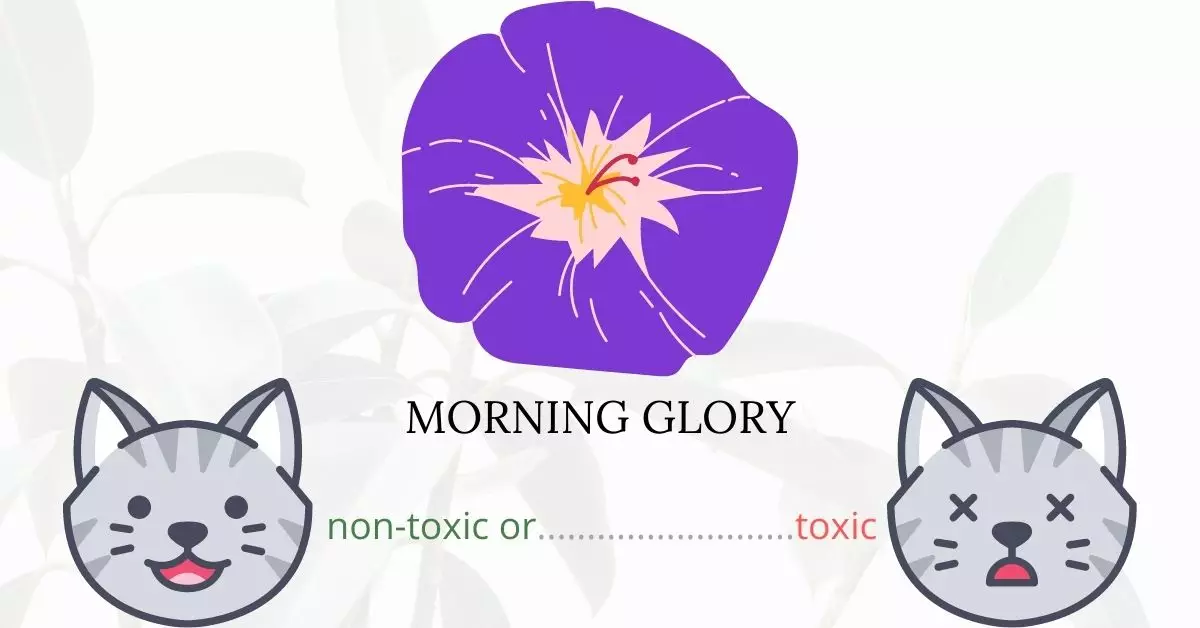Yes, Morning Glories are toxic to cats.
Written in collaboration with a team of experienced DVMs (doctors of veterinary medicine), this article provides accurate and up-to-date information on the potential risks associated with Morning Glories and their effects on feline companions. In addition to the invaluable insights from our veterinary experts, our research is further bolstered by high-authority websites such as ASPCA and PetMD.
Morning glory, popularly cultivated for its vibrant trumpet-shaped flowers and attractive foliage, is more than just a visual treat. This plant contains indole alkaloids such as lysergic acid, lysergamide, elymoclavine, and chanoclavine. When ingested by cats, these compounds can interfere with the serotonin’s natural activity in the brain, leading to symptoms like delusions, stupor, or hallucinations. As a result, a cat that consumes any part of the morning glory plant may display aggressive behavior, lose its balance, or exhibit signs of drowsiness accompanied by heavy panting.
Clinical Signs of Morning Glory Poisoning in Cats
When a cat comes in contact, inhales, or ingests the Morning Glory plant, particularly some specific species, they might exhibit several clinical signs due to the toxic components present in the plant. These clinical signs occur due to the plant’s indole alkaloids, such as lysergic acid, interfering with the natural activity of serotonin in the cat’s brain. Here’s a deeper look at each clinical sign and its underlying cause:
- Vomiting and Diarrhea: Ingestion of Morning Glory can irritate the cat’s gastrointestinal system, leading to vomiting and diarrhea. It is the body’s way of expelling the toxic elements ingested.
- Increase in Aggression: The alteration of serotonin activity in the brain can result in behavioral changes, such as heightened aggression, due to altered perception and responsiveness to the environment.
- Inability to Stand and Lack of Coordination: The neural interference caused by the toxins can affect the cat’s motor skills, making it difficult for the animal to maintain balance, stand, or move with coordination.
- Lethargy with Excessive Panting: The physiological stress induced by the plant’s toxins may lead to lethargy due to energy depletion, while excessive panting might occur as the body’s response to counteract the poisoning, enhancing oxygen intake.
- Hallucinations: The lysergic acid present in Morning Glory seeds may lead to hallucinations in cats. It alters their sensory perception, making them see, hear, or feel things that are not present, causing distress and abnormal behavior.
Cat owners should be vigilant and observe their pets closely for any of these clinical signs if they suspect contact or ingestion of the Morning Glory plant and should seek immediate veterinary assistance to mitigate the risks and effects of the poisoning.
First Aid and Treatment of Morning Glory Poisoning in Cats
Veterinary intervention is still essential to be on the safe side, whether the symptoms of your cat are only mild to moderate. According to your cat’s needs, the veterinarian will most likely administer symptomatic and supportive medication. Inducing vomiting, intravenous hydration therapy, and the administration of activated charcoal are all possible treatments. Your veterinarian may also prescribe medicine to help your cat with other symptoms.
Recovery from Morning Glory Poisoning in Cats
Generally, cats fully recuperate from morning glory poisoning within 24 to 48 hours. Before going home from the veterinary office, discuss with the veterinarian if there is any post-treatment care that you should give your cat. Take preventative measures to avoid another plant poisoning incident.
Prevention of Morning Glory Poisoning in Cats
Morning glories are not recommended to be grown within a residence with cats living in it. Make sure to remove this plant from your gardens. Limit your cat from going outside your house to lessen the possibility of an encounter with morning glory and other poisonous plants that may be growing in your neighborhood.
If you love plants but have cats at home, check out these lists:





